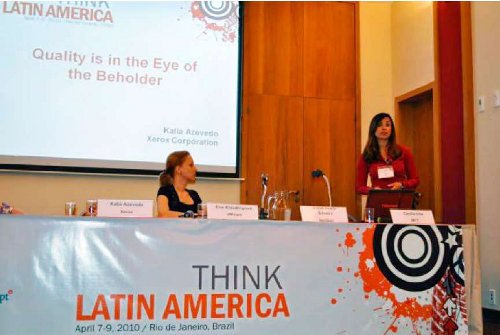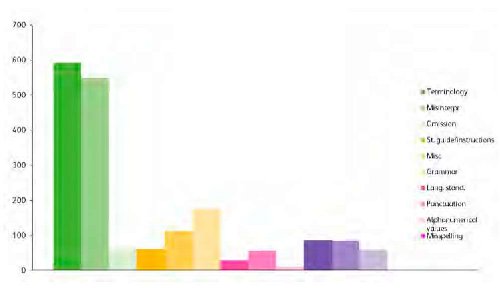 |
 |
 |
| Home | More Articles | Join as a Member! | Post Your Job - Free! | All Translation Agencies |
|
|||||||
|
|
The Xerox Translation Quality Assessment Process
Our Translation division within Xerox Global Document Outsourcing has nearly 40 years of experience in successfully managing product documentation development, localization and learning services. We have over 1,500 document specialists, translators, project managers and learning experts worldwide and are one of the top language service providers with production office locations that span the Americas to Europe to Singapore. Xerox Translation Quality Assessment (TQA) Process—Key Points
 Proofreading - Crucial to the TQA Process Proofreaders: All Xerox proofreaders are fully qualified translators with appropriate subject matter expertise. Proofreading activities consist of a complete check of translated content against its source equivalent, checking for correct meaning, adherence to glossaries (when available), grammar, punctuation, spelling and completeness. All translators’ work is proofread until their output reaches required client quality levels as measured through the TQA process. Once this has been achieved, random spot checks are carried out continuously to ensure our processes maintain required quality levels. Localization Specific Quality Management System/TQA: At Xerox we have developed our own QA model, process and technology that is heavily based on SAE J2450. By developing our own tool, we are able to continuously improve and develop its functionality. We can also customize the tool and processes to meet our customers’ specific requirements. The Xerox TQA model provides a detailed breakdown of corrections made during proofreading and the defect categories these corrections fall into. Errors e categorized as follows:
Any errors identified are classified as minor, serious or critical and given an appropriate score. All quality assessors are given clear guidelines on how to assess content so as to ensure a consistent approach to categorization and classification of errors. 
High Supplier Standards—the Xerox Supplier Recruitment and Evaluation Process A Closed-Loop Process All Xerox translators are ranked according to their experience and ability. Rankings go from T1, the least experienced, to T5, expert level. Translators can have different ranks for different document types and subject matters. All translations performed by T1 - 3 translators are proofread by T4 - 5 translators, using the Xerox TQA model. Regular TQA review meetings are arranged in order to analyze the TQA data and determine the T ranking of individual translators. T ranking decisions are based on the average TQA score, most frequently recurring error categories, volume of translations completed and proofreaders’ comments. When applying the Xerox TQA model, the proofreader can insert comments directly into the translated file using specific error codes. Xerox employs a TQA Administrator who runs a Xerox proprietary tool on the pre- and post-proofed files. This tool generates comparison reports and automatically fills in a central global TQA tracking sheet. The TQA Administrator sends the TQA comparison report back to the original translator, who is requested to review the report and adhere to corrections made. All data is tracked and reviewed. This process provides Xerox with detailed performance data on each translation professional working on any of its projects. The feedback loop ensures that all Xerox translators (whether in-house or external) are aware of quality expectations and are able to improve and develop their translation skills. The Xerox TQA process provides objective, structured data management, which enables:
It is important to have documented standards when it comes to selecting translation suppliers. We have broken ours down into three categories. Translators Xerox-qualified translators must have in-depth knowledge of the subject matter at hand; our selection criteria include:
Lead Translators Large volume projects requiring many translators working in parallel are assigned a Lead Translator for each target language who coordinates work across translators, responds to linguistic queries and oversees quality. A Lead Translator will have:
Proofreaders Proofreading activities consist of a complete check of translated content against its source equivalent, checking for correct meaning, adherence to glossaries (if available), grammar, punctuation, spelling and completeness. All Xerox proofreaders are:
Additionally, we provide subject-matter training and support to highly qualified translators to further build skill sets. The Different Flavors of Spanish The Think Latin America Conference came at the perfect time for us. We are increasingly receiving requests for different flavors of Spanish, targeting specific markets and regions. Therefore, we have adopted translator-profile changes based upon customer specific requests (such as, the target audience could be Spanish-speaking population living in the U.S.). To accommodate all requests, we have established different approaches, including:
TQA enables us at Xerox to drive best translation and localization practices. And our over-arching best practice when it comes to delivering our translations: the approach needs to meet each customer’s specific needs! After all, quality is in the eye of the beholder. About the author: Katia Azevedo - Language Services Manager/Xerox Global Document Outsourcing, North America. Katia has over 24 years of experience in the translation and localization industry and has participated in and presented at several localization events in the United States. Katia has a Master’s of Science degree with Honors in Strategic Leadership from Roberts Wesleyan College at Rochester, New York in 2001 and a Bachelor’s degree in Language and Literature from Rio de Janeiro State University (UERJ). Published - June 2012
ClientSide News Magazine - www.clientsidenews.com
E-mail this article to your colleague! Need more translation jobs? Click here! Translation agencies are welcome to register here - Free! Freelance translators are welcome to register here - Free! |
|
|
Legal Disclaimer Site Map |